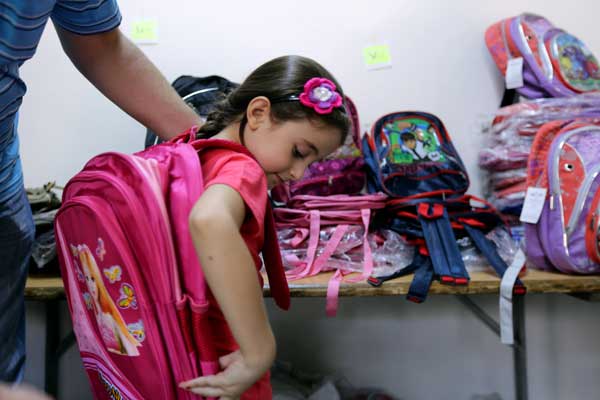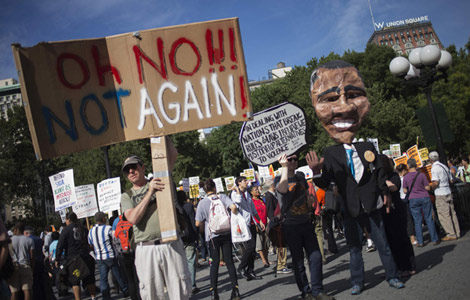Schooling may become luxury as attack looms
Updated: 2013-09-10 01:40
(China Daily/Agencies)
|
||||||||
With one week left before the school year starts in Damascus, parents hoping it might bring some normalcy to their youngsters' lives have yet another headache with the threat of US military strikes.
The military conflict has disrupted education in Syria. More than 40 percent of children between the ages of 6 and 15 no longer attend school, said the UN children's agency, UNICEF, after 30 months of bloody conflict that has killed more than 100,000 people.
 |
|
A Syrian girl tries on a backpack at a bazaar organized by Saint Joseph Church in Damascus on Sunday. UNICEF said more than 40 percent of children between the ages of 6 and 15 no longer attend school amid military tension. Photo by Agence France-Presse |
In the capital, schools have fared comparatively well, even though many are used as shelters for those displaced by fighting on the outskirts of Damascus.
But the military action being pondered by Washington has heightened the stress for parents already coping with supply shortages and rising costs, not to mention concerns about long-term trauma war may cause their children.
Like many families, Muwaffaq, his wife, daughter and son headed to the historic Hamidieh souk in the heart of Damascus to buy supplies before the term starts on Sept 15.
"With the war drums beating in the United States, who knows what will happen? The schools could very well close," he said.
US President Barack Obama has called for military intervention against Damascus over alleged chemical weapon attacks on Aug 21.
"Of course we are worried for the schools," said Nuhad, a 30-something mother of three.
"It depends on the areas. For example, we live near a possible target in Damascus, so it's not very reassuring."
"Many parents are waiting for a strike. Others are already saying they won't send their children to school if things get worse," said Ahmed, a shopkeeper on Meskiya Street, as he arranged packets of felt tip pens.
Since the war came to the suburbs around the capital, residents say they have been signing their children up for schools closer to their homes.
"Damascus has been on the edges of the war for two years now, but the fear is that the war will spread and the schools close," said Mahmud Subhiya, as he bought a packet of pencils for his son.
UNICEF said more than 3,000 schools (2,000 according to the Syrian authorities) have been destroyed since the beginning of the conflict in March 2011, and another 900 are occupied by families displaced by the fighting.
"In my class, there are now three people to every bench instead of two," said Lamis, a 7-year-old who had come to Hamidieh to buy a new pencil case.
"And the teachers who come from far away are late sometimes," she said.
In the maze of shop lined alleyways in the marketplace, families flock in search of bargains after a year that has seen the costs of many goods skyrocket.
Salma, while browsing for school supplies, admits she is struggling. "I still haven't bought anything for my daughter. I am just looking, it's unaffordable," she said.
By Agence France-Presse

 Chinese fleet visits Pearl Harbor in Hawaii
Chinese fleet visits Pearl Harbor in Hawaii
 US: Proven link of Assad to gas attack lacking
US: Proven link of Assad to gas attack lacking
 Serena Williams repeats as US Open champion
Serena Williams repeats as US Open champion
 Panda 'Bai Yun' celebrates 22nd birthday in US
Panda 'Bai Yun' celebrates 22nd birthday in US
 Exports expand in Aug amid signs of recovery
Exports expand in Aug amid signs of recovery
 Rodman back from DPRK without jailed American
Rodman back from DPRK without jailed American
 National Games: Pictures of the day
National Games: Pictures of the day
 Abe speech helps secure 2020 Games for Tokyo
Abe speech helps secure 2020 Games for Tokyo
Most Viewed
Editor's Picks

|

|

|

|

|

|
Today's Top News
Shanghai FTZ 15% corporate tax rate rumor denied
DPRK leader has a baby daughter: Rodman
US: Proven link of Assad to gas attack lacking
Li: China pursues sustainable growth
Trending news across China
China-US military ties deepen
Inflation slows to 2.6% in August
Chinese president arrives in Uzbekistan for visit
US Weekly

|

|






